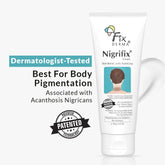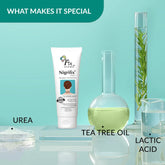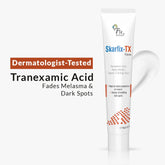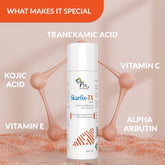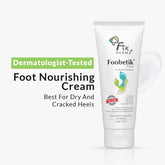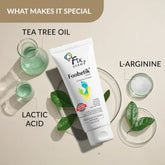The Science Behind Dry Skin and Acne: Can They Coexist?

Are you wondering why you're getting acne when you don't have oily or sensitive skin? You don’t necessarily need oily or sensitive skin to experience acne because dry skin can also host acne. Acne and dry skin can coexist and have an impact on one another. However, acne-fighting compounds can be inculcated in your skincare routine to prevent undesired dryness of the skin. Experts have also recommended over-the-counter medications to address the same issue.
What is dry skin or xerosis?
Xerosis, commonly called dry skin, refers to the rough, flaky patches of skin that occur when the skin looses moisture and hydration. Age, hormonal changes, bathing habits, medical history, season, vitamin deficiencies, and skin barrier disruption are a few common causes of dry skin. Three different kinds of dry skin that exist are mentioned below:
- Seborrheic dermatitis: The red itchy patches and greasy scales on the skin with white or yellow crusty flakes on the scalp. These are commonly called dandruff when it's on a teenager’s or adult’s skin and a ‘cradle cap’ on a baby’s skin.
- Contact dermatitis: These are the itchy rashes caused on the skin when triggered by allergens. These are usually patches of skin covered with red, itchy bumps. These can be swollen, flaky or scaly.
- Atopic dermatitis: This category of dermatitis is chronic and causes itchy, rash skin that gets dry and scaly. Cracked skin is also a result of the condition and is triggered when the skin barrier function is not proper.
Dermatological Approach to Dry Skin
- Introducing the Right moisturizer rich in glycerin, cica, shea butter, urea and oils like jojoba, coconut oil, vitamin E, etc can help with calming down the sensitive, red and itchy skin.
- Introducing Hyaluronic Acid serums to your skincare routine can hydrate the skin to a deeper level
- Hydrating mists are helpful and can be used twice a day to provide hydration, smoothness and suppleness to the skin.
- You should keep a check on your vitamins and minerals such as Omega 3 and 6, vitamin E and sodium-potassium levels as they play a crucial role in keeping the skin healthy.
- Applying a broad spectrum with SPF 50/60 should be used during the daytime to protect the skin from free radical damage and prevent moisture loss.
- Avoid high dosages of caffeine intake which can severely dehydrate the skin.
What is acne?
As you are aware, clogged hair follicles on the skin cause acne. Most of the time, increased sebum production from sebaceous glands causes this obstruction. The buildup of dead skin cells may exacerbate this obstruction. This results in bacterial accumulation and skin lumps that exacerbate the illness. As a result, the dry skin becomes flaky and scaly and lacks moisture. Eczema and dermatitis can also appear on dry skin, which may have an underlying reason.
Can acne appear on dry skin?
Acne is a skin condition marked by pimples on the skin, especially on the face, caused by irritated or infected sebaceous glands.
It is a common misconception that acne can only be caused by oily skin. What you may not be familiar with is how acne appears on dry skin. Since dry skin lacks moisture, it tends to produce excess oil which clogs the pores and encourages the growth of bacteria. This triggers acne breakouts and which can even blemish your skin. Several other factors can also cause this skin condition which include, age, genetics, hormones, use of pore-clogging skin care products, and humidity levels.
Let's examine these factors in more detail.
- Lack of moisture: The zero level of moisture on dry skin compromises the skin barrier function, causing overproduction of sebum and natural oils, which in turn build up on the skin, clogging the follicles.
- Impaired skin barrier: This is the number one cause of bacterial growth which results in inflammation due to which acne worsens.
- Environmental Factors: Conditions like cold weather, low humidity, or exposure to harsh chemicals can make dry skin worse.
- Harsh exfoliants: Gentle exfoliation is suggested for people with dry skin because over-exfoliation and the use of harsh products can irritate the skin worsening the acne.
- UV rays: Choosing a broad-spectrum SPF to protect the skin from harmful UV rays avoids pore clogging. Always remember to pick a non-comedogenic sunscreen that is free from pore clogging.
Hydrating Treatments for Acne-Prone Dry Skin
The right moisturizer will be a perfect companion for your dry skin. Two important things to keep in mind before choosing moisturizers for your skin are that it is oil-free and non-comedogenic. If these two are checked, the moisturizer is unlikely to clog pores and cause acne.
Applying the moisturizer right after washing can trap more water and keep the skin hydrated. Studies have shown that you can expect results in not more than 4 - 8 weeks.
You can start your dry skin care regimen with a good hydrating acne cleanser that contains benzoyl peroxide or salicylic acid. These formulas will help in controlling acne. Hyaluronic acid and niacinamide can also help soothe your dry skin.
Cases of severe acne can be treated after consultation with a dermatologist or a skin expert as you might need a high concentration of benzoyl peroxide. The right moisturizer can also complement any other anti-acne products you might be using.
Balancing Moisture and Oil Control in Acne-Prone Dry Skin
The yin and yang of the skin that maintains equilibrium are moisture and oil. It's not only about SPF; natural oils also support and preserve the skin's lipid barrier, shielding the inner layers of the skin from outside influences such as pollution and UV radiation. A few drops of oil can enhance your skin's protective, moisturizing barrier and prevent dehydration by sealing in essential fatty acids and retaining water on the skin. The water content of our skin cells is referred to as hydration, on the other hand. Sustaining the skin's suppleness, plumpness, and general health requires adequate hydration.
When the oil and water concentration is not balanced, the skin becomes fragile from pore clogging. The moisturizer, which contains hyaluronic acid is recognized for its moisture-building properties. Keep in mind that dry skin might cause irritation or acne in certain people, so if you fall into this category, a gel cream or light lotion would be a decent choice as a moisturizer. Hydrating mists are another option for keeping your skin moisturized without having to use a heavy cream.
Achieving an equilibrium to this balance is crucial if you have dry skin and face acne breakouts. This depends on maintaining a healthy skin barrier. This helps to hold in moisture and fights off the factors that cause dry and flaky skin.
Dermatological Approach to Acne-Prone Dry Skin
Derma says, to achieve a clear and acne-free skin can be challenging, but doable. This can be begun by ditching irritating skin care products which include foaming cleansers, toners, essences, fragrance mists, serums with active ingredients, store bouts face masks, essential oils, etc.
You can follow these simple steps to attain a better skin texture :
- Choose the right moisturizer: You can choose a moisturizer that will fight off inflammation. The higher oil content in these products (ointments and creams preferred) will soothe your dry skin. Jojoba oils, hyaluronic acid and shea butter are on top of the list that seals in moisture in your skin.
- Humidify your environment: Introduce a humidifier to your environment which is beneficial during winters. This will balance the level of humidity which is good for your skin.
- Hand off the face: Once you start with the kin regimen for dry skin, it is normal to experience skin tightening and breakouts. Keeping your hands off the face and skin is the best option for you to improve the process.
- Diet: High sugar intake can add to breakouts and acne easily. Not only sweets, but caffeine can also worsen the skin condition by dehydrating your skin.
- Skin care products: Always choose a non-comedogenic moisturizer on dry skin. Use a hydrating cleanser and alcohol-free toners to restore the pH of the skin (4- 5 pH).
Here are some tips for taking care of dry skin :
- You can always go for yogurt, which contains lactic acid that nourishes your skin. Aloe vera and raw honey are two other go-to options if you are looking for soothing and non-inflamed skin.
- Closing the door and not running the exhaust while showering can retain the humidity in the air.
- Use warm water and limit shower time to 5 - 10 minutes.
- Opt for gentle, fragrance-free and non-foaming cleansers.
- Gently pat on the skin with a towel and apply moisturizer immediately after drying off.
Sensitive Skin with Acne Solutions
As your acne treatment fights pimples, you must do your bit to keep your sensitive skin feeling soothed and relaxed. Consider it this way: Treating delicate skin requires special sensitivity. Avoid anything that could irritate you and keep a keen eye on the ingredients of products that you use.
- Usage of Benzoyl peroxide for treating breakouts is a good option if you have sensitive skin. You can either go for a facewash containing the ingredient or do a spot treatment with the same. It is best to start with low-strength options in this case as it’ll allow your skin to adjust to changes.
- Another great topical ingredient to look for is salicylic acid, an active ingredient in many acne-fighting facial cleansers. Salicylic acid is a chemical exfoliant that treats acne by working to keep your pores unclogged. Just like products that contain benzoyl peroxide, start slowly to avoid irritation if you have sensitive skin.
- Avoid using brutal scrubs. You may be tempted to scrub in an attempt to get rid of breakouts and blackheads on your skin. However, refrain from doing so.
- Using grainy cleansers or abrasive exfoliants is not necessary. To get rid of acne, you shouldn't scrub your skin with washcloths or rough washing pads. Your delicate skin type is better suited for softer treatments.
- Introduce new products gradually. Use caution when introducing new skincare products until you are familiar with how your skin responds. Before attempting it on your face, you might even want to give it a quick test on your inner arm to see if there is any reaction.
- Additionally, begin using acne remedies cautiously. Of course, you want to get rid of the pimples quickly. However, over-the-counter (OTC) acne treatment solutions can also irritate and dry up your skin.
- Use your treatment products no more than three times a week at first. If your skin responds favorably to it, gradually increase the frequency of application.
- Avoid Using Several Products at Once. For your delicate skin, using an acne treatment cleanser on top of a medicated lotion, astringent, and prescription medication is overkill.
- Watch out for add-on treatments. Acne can be treated with topical medications such as benzoyl peroxide or Retin-A (tretinoin). However, do not allow them to remain on your skin all day (or night).
- For sensitive skin, the treatments can be excessive. As an alternate, you can try washing off "leave-on" drugs after 10, 20, or 30 minutes, even if it may seem counterintuitive. You should be able to wear the medication for extended periods as your skin becomes less sensitive to it.
Fixderma’s acne-prone, dry skin skincare regimen focuses on gentle care and hydration. You can include the following dermatologically tested, chemical-free free and cruelty-free Fixderma products to nourish your skin.
- Cleansing: FIXDERMA SALYZAP CLEANSER is a soap-free face wash that effectively fights acne. It does not deplete the skin of its natural oils but exfoliates keratinized skin and clears clogged pores caused by excess sebum.
- Serum application: Infused with Azelaic acid, Mandelic acid and Salicylic acid, FIXDERMA ANTI ACNE FACE SERUM is formulated carefully for deeper exfoliation of the skin and clearing acne and inflammations.
- Moisturizing: FIXDERMA FACE 21 CREAM is a gentle cleansing formula, enriched with Kakadu plum and willow bark, that helps in achieving a flawless glow.
- UV Protection: FIXDERMA SHADOW SPF 50+ GEL is a lightweight sunscreen specially designed for acne-prone skin. The gel has been formulated with the most photostable sun protectors which is ideal for all weathers and suits all skin types. This oil-free formulation provides excellent UV ray coverage for a longer duration of time.
Effective skincare involves understanding how your skin type and acne interact. It’s a common misconception that only oily skin causes acne; dry skin can also produce excess oil, leading to breakouts. To improve your skin’s health, focus on a balanced diet and maintain the right levels of moisture and oil. If you’re dealing with persistent or severe issues, consulting a professional is essential for finding the best solutions.
